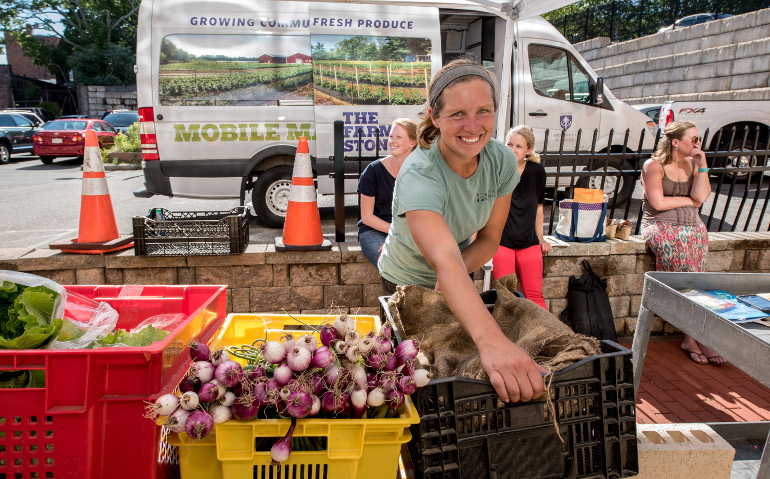
Global warming affecting farmers. The paucity of access to fresh produce in urban areas, resulting in food deserts. The environmental benefit of eating what is produced in the neighborhood.
These are environmental and social justice concerns ripe for classroom discussion. At Stonehill College, a liberal arts institution founded by the Congregation of the Holy Cross in Easton, Mass., these concerns can also mean getting hands dirty, planting and harvesting at a small farm operated by the college.
The one-and-a-half acre plot provides an earthy educational experience for Stonehill students and professors.
"It has been a seedbed for conversations around food justice and food access, as well as environmental stewardship," Holy Cross Fr. James Lies, vice president for mission at the school, told NCR.
The Farm at Stonehill was established in 2009 by Paul DaPonte, now a religious studies professor and at the time vice president for mission. Today, it gathers 600 volunteer workers each year and harvests 12,000 pounds of produce, which is distributed in nearby Brockton to local food banks or at a reduced cost.
Classes in environmental science are held at the farm, on land donated to the school. Classes in social justice as well as theology — Jesus' parables describing rural life make the farm a poignant backdrop — are also held there.
There's a direct theological link, said Lies, who was raised in rural Minnesota. The church's renewed concern about environmental issues, noted in Pope Francis' encyclical "Laudato Si', on Care for Our Common Home," is a favorite theme. The Farm at Stonehill also carries on the philosophy of Basil Moreau, the 19th-century French priest and founder of the Congregation of the Holy Cross, who emphasized, "We will not educate the mind at the expense of the heart."
Lies noted, "Concepts like hunger, food deserts and the relationship between poor health and poverty become a lot more real when you plant the seeds, water, weed, harvest and drive a truckload of beets, zucchini and broccoli to help fill the shelves of the local food pantry."
Bridget Meigs, farm manager and professor of environmental science, added that the farm produces about a hundred different types of produce.
"I have a passion for food access," said Meigs, a graduate of Cornell University's agricultural school. She is assisted at the farm by three student managers, who are paid stipends, and by volunteers from the college and the wider community.
Enthusiasm for the project is a constant, she said.
"It's contagious. The more you learn about farming, the more you know there's a need to learn more," she said.

The Farm at Stonehill College (Courtesy of Stonehill College)
Transforming the local food desert in an impoverished section of Brockton is an object lesson in assisting the poor with a basic need. "Equal access to produce has become a social justice issue," said Meigs, noting widespread studies indicating that poor neighborhoods in the U.S. lack stores that sell fresh food.
Crops include items rarely seen in the small groceries in the poorer sections of Brockton. The farm produces green kale, white squash, pumpkins, tomatoes, potatoes, zucchini and onions, among other items.
Sociology and theology, biology, photography and economics, earth science and American literature are all taught at the farm.
For each subject, said Lies, there are lessons in the earth, including the economic hurdles between the poor and nutritious food. English literature students can experience Henry David Thoreau's Walden in a natural environment.
It's an educational model that should be the norm, said Meigs.
"If every college had a farm, we could build community and address food security issues," she noted.
[Peter Feuerherd is a professor of communications and journalism at St. John's University in New York and contributor to NCR's Field Hospital blog.]




